The FDA - Failure On A Mass Scale
The Role of the Federal Drug Administration (FDA)
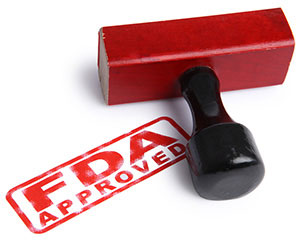 The FDA is responsible for approving and regulating food, drugs, supplements, and any other products that could be harmful to our health. But the truth is, far from protecting that health, the FDA has clearly shown a conflict of interest when it comes to maximizing the profit of the food and pharmaceutical giants instead of protecting the health and welfare of the American people.
The FDA is responsible for approving and regulating food, drugs, supplements, and any other products that could be harmful to our health. But the truth is, far from protecting that health, the FDA has clearly shown a conflict of interest when it comes to maximizing the profit of the food and pharmaceutical giants instead of protecting the health and welfare of the American people.
Our Food
Processed foods | GMOs | Factory-farming | Pesticides | Irradiation | Food from China
Processed & Refined Food Chain
According to the World Health Organization, the contamination of our food by dangerous chemicals has become a worldwide public health concern, and is even the cause of trade problems between countries who have banned some of these chemicals:
- The majority of the food sold in supermarkets throughout the US is heavily processed and refined, and filled with artificial chemicals and ingredients (some of which are recognized carcinogens). They contain products that the FDA themselves have recognized as dangerous to the public's health and yet are still considered perfectly acceptable in our food chain.
For example, even though the FDA recognizes that labeling trans fats (hydrogenated fats) will prevent 7,000 deaths from heart disease, and 20,000 heart attacks each year (at an annual healthcare cost savings of $1 billion), inexplicably, it still allows this toxic fat to be part of our food chain whereas it has been banned in other countries.(1)
- Even though obesity, heart disease, and diabetes are entirely preventable through diet, neither the FDA nor the USDA provides any public education (schools included) on the importance of sound nutrition and healthy lifestyle choices.
- Many artificial chemicals used in processed foods are banned in other countries. In 2005 & 2007, the British government sponsored 2 studies and concluded that several commonly used food dyes promoted hyperactivity in children, and restricted their use in foods. Food sold in the European Union containing food dyes must now have a warning label about hyperactivity. In stark contrast, the FDA claims there is "no evidence" that food coloring causes any health issues in children. The Grocery Manufacturers Association also claims there is no need for consumers to alter their purchasing and eating habits, and that children can "safely" enjoy food products containing these food colors.
- The FDA gives food manufacturers the freedom to use words such as "natural" and "heart healthy" on the food packaging of unhealthy products. Food manufacturers are happily left to their own devices to decide what is healthy and what is not, and slap false health claims on foods that contain very unhealthy and toxic ingredients. This false advertising intentionally misleads the public and gives a false sense of security about the foods they eat.
Genetically Modified Organisms (GMOs)
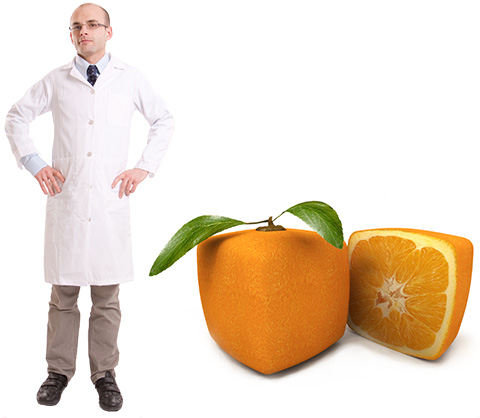 Health Dangers
Health Dangers
Independent publicly funded studies conducted outside of the US have revealed serious health hazards stemming from consuming GMOs, ranging from organ damage, to birth defects, to premature death. A substantial body of scientific evidence is beginning to slowly emerge on the health hazards of GM crops, and scientists conducting studies around the world are sounding alarm bells. ...Read more- No Labeling
Genetically modified foods are labeled in over 60 countries around the world, including Europe, Japan, Australia, and New Zealand. Food manufacturers such as General Mills and Kraft sell the exact same product in these countries as they do in the US, and yet consumers in these countries are more informed about genetically modified contents than consumers in the US are. The American consumer is denied the right to choose not to purchase a genetically modified product, whereas millions of consumers worldwide are not denied this right. - No Testing
The FDA has not conducted any long term studies on any genetically modified crops, nor does the FDA have any mandatory testing requirements or testing protocols for the biotech companies who develop these crops to follow when they test their products.The government protects the biotech companies by not allowing any independent third party testing of the GMOs without the permission of the biotech companies themselves. This protection is possible because the seeds are "patented" and protected by patent law. If the crops really pose no health concerns and there is nothing to hide, then why aggressively deny any independent testing?
- No Accountability
The FDA allows biotech companies to perform their own studies on the GMOs they produce, or allows biotech companies to determine who may perform these studies under secrecy agreements the public has no access to.In fact, the government took major steps to try and protect biotech's who produce GMOs. The "Monsanto Protection Act" was a budget provision that would have protected biotech companies from ANY litigation as a result of adverse health effects that result from the public eating their products. In other words, they would be protected from any lawsuits if their crops were found to cause health issues. Luckily, public outcry (not a responsible and proactive FDA) prevented this act from passing.
Factory Farming
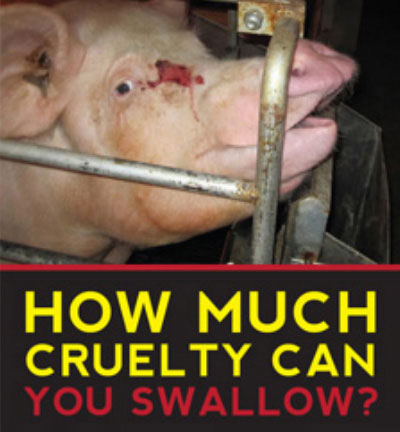 Also known as feedlot meat, over 99% of all meat sold in stores and in restaurants throughout the US is called factory farmed meat. If you eat meat that is not labeled as "pasture-raised" or "organic," you are eating factory farmed meat.
Also known as feedlot meat, over 99% of all meat sold in stores and in restaurants throughout the US is called factory farmed meat. If you eat meat that is not labeled as "pasture-raised" or "organic," you are eating factory farmed meat.
Factory-farming is an illegal practice in other civilized countries such as Europe, Australia, and New Zealand. This practice involves the extremely cruel and inhumane treatment of animals, uncovered time and again by courageous whistle-blowers and welfare organizations working hard to expose this highly unethical business. ...Read more
Not only is factory farming in the US inhumane, it has created a meat chain that directly contributes to chronic disease:
- 80% of the US supply of antibiotics is used in factory-farming. The livestock industry pumps farm animals with antibiotics to prevent sickness from:
- The unsanitary conditions animals are raised in,
- Disease arising from cruel and inhumane treatment, and
- Infections from animals mutilating themselves due to unnatural living conditions.
Factory farming practices are extremely illegal in other countries. It is a contributing factor to the antibiotic resistance that the medical field is now recognizing as a serious problem. According to the CDC, antibiotic resistance kills at least 23,000 each year, with at least 2 million becoming infected with antibiotic-resistant bacteria. - Steroids, growth hormones, and medicated additives are routinely fed to livestock. Traces of these drugs are found in the muscle meat sold to the general public. These and many other chemicals systematically added to their food contribute to chronic disease in factory-farmed animals, just as they do in humans. This unhealthy meat is then eaten by consumers.
- Malignant tumors are routinely found in animals that are sent for slaughter. As a very small percentage of animals that pass through the slaughterhouse are inspected, many diseased animals undoubtedly make it to the kitchen table.
- Inappropriate foods comprised of genetically modified corn and soy are now a main source of food for factory-farmed animals, instead of the grass that is their natural diet. Just as these processed foods contribute to health decline in humans, so too do they contribute to the health decline in these unfortunate animals.
| Ag-Gag Laws - Uncivilized & Barbaric Instead of banning factory farming practices, the government has taken the shocking step of doing the exact opposite - allowing the "Ag Gag" law to pass in several US states. This law makes it a criminal offense for any organization to expose cruelty on factory farms. It makes it illegal to "gather evidence, by film or photography, about the internal operations of factory farms where animals are being raised." Some states already exempt factory farms from ANY animal cruelty restrictions. The sole purpose of the ag-gag law is to allow farms to treat animals as they choose and never be held legally accountable, while keeping consumers in the dark and preventing them from knowing the very disturbing truth about what happens to these animals behind closed doors. This failure lies squarely on the shoulders of the American government. |
Eat Meat Responsibly or Choose Vegetarian
Pesticides
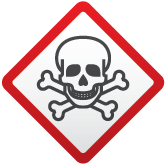 Studies have conclusively shown that pesticides in our food are linked to serious health concerns, including:
Studies have conclusively shown that pesticides in our food are linked to serious health concerns, including:
Cancer (breast, brain, prostate, & intestinal cancer, neuroblastoma, soft tissue sarcoma)
Childhood leukemia
Parkinson's disease
Fetal death
Neurological damage
Stunted Growth
Autism
Canine cancer
Irradiated Foods
- Health Dangers
Studies on animals fed irradiated foods have shown increased tumors, reproductive failures, and kidney damage. Chromosomal abnormalities occurred in children from India who were fed freshly irradiated wheat. ...Read more  Labeling Loopholes
Labeling Loopholes
The FDA requires irradiated foods to include an international symbol called the "radura" - a picture which resembles a leafy plant in a circle. Unfortunately, manufacturers are not required to print ANY irradiation disclosure or symbol on their food labels if the product contains at least ONE item that has not been irradiated. So, for example, if a product contains 5 ingredients, 4 of which are irradiated and 1 which is not, the manufacturer is not required to display any irradiation symbol. This effectively makes the labeling law worthless.- No Testing
The FDA has conducted no long-term studies on irradiated foods or their effects on human health, nor does it require any long-term studies on irradiated foods.
Food From China
 The biggest food recall in history was the result of melamine-contaminated food from China. This tragedy resulted in the recall of 60 million dog food units in 95 different brands. It caused thousands of pets to die of kidney disease, 294,000 kidney-related illnesses in infants, and 6 infant deaths. The widespread outrage also triggered a congressional hearing.
The biggest food recall in history was the result of melamine-contaminated food from China. This tragedy resulted in the recall of 60 million dog food units in 95 different brands. It caused thousands of pets to die of kidney disease, 294,000 kidney-related illnesses in infants, and 6 infant deaths. The widespread outrage also triggered a congressional hearing.
This is far from the only food recall on Chinese products. There are very serious concerns when it comes to China and food safety, and far from being proactive in protecting the American public, the government has taken a very lax approach. ...Read more
- Lax Labeling Laws
Even though some of the biggest product recalls experienced in the US are a result of poor quality control in China, the FDA does not require food manufacturer to specify on their label whether any ingredient in their product is sourced from China. - Abysmal Inspection Standards
Very little of the food that arrives from China is inspected by the FDA (under 2%). In 2011 alone, more than half of the food processing and packaging firms in China failed safety inspections, as reported by a China-based food quality control company who called this figure "alarming". Rodent fecal contamination was responsible for around 10% of this figure.Instead of using the common-sense approach of both reducing and inspecting all imported food from countries such as China, the USDA and FDA are now allowing US food retailers to import even more food from China.
Our Pet's Food
 The general public trusts that the government will do all it can to protect their pets from dangerous pet foods and treats on the shelf. This is far from the case.
The general public trusts that the government will do all it can to protect their pets from dangerous pet foods and treats on the shelf. This is far from the case.
- Contaminated Jerky
Since 2007, the FDA has been aware of thousands of illnesses in pets associated with the consumption of jerky pet treats. As of September 24, 2013, it has received over 3,000 reports of pet illnesses that may be related to the consumption of jerky treats, most sourced from China. The reports involve more than 3,600 dogs, 10 cats, and includes more than 580 deaths.Even though the FDA themselves have determined most of the contaminated jerky is sourced from China, they have done nothing to ban its importation. Instead, the FDA simply left it in the hands of the pet food manufacturers themselves as to whether or not these foods "should" be recalled. Luckily, over 100 brands of jerky treats have been voluntarily recalled due to the alarming reports of kidney failure.
- Dangerous Items Allowed In Pet Food
Although largely unknown to the general public, the FDA allows the following items to be legally used in commercial pet foods:
-
- Recalled foods
- Expired foods
- Meat from diseased animals
- Foods contaminated with bird, rodent, or roach excrement
For more details on these disturbing FDA policies, visit the FDA website:
|
FDA Compliance Policies & Pet Food CPG Sec. 675.100 Diversion of Contaminated Food for Animal Use CPG Sec. 690.300 Canned Pet Food CPG Sec. 675.400 Rendered Animal Feed Ingredients
“No regulatory action will be considered for animal feed ingredients resulting from the ordinary rendering process of industry, including those using animals that have died otherwise than by slaughter, provided they are not otherwise in violation of the law. Compliance Policy Guide 7126.08 recognizes the AAFCO definitions as generally constituting the common or usual names for animal feed ingredients conforming in origin and content to these definitions. Included are such products as poultry by-product meal, meat meal, meat and bone meal and fish meal.” |
Our Pharmaceuticals
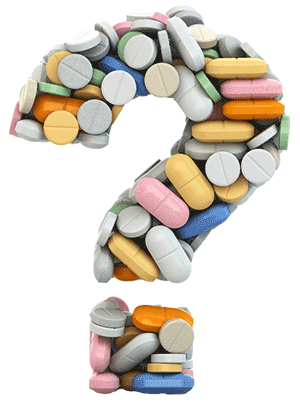 Millions of Americans become seriously ill from the toxic reactions of both correctly and incorrectly prescribed medications that are FDA approved.
Millions of Americans become seriously ill from the toxic reactions of both correctly and incorrectly prescribed medications that are FDA approved.
- The FDA approves many drugs that do more harm than good, and routinely approves drugs that have very dangerous side effects, including increased risk of:
- Cancer
- Heart disease, stroke, high blood pressure, low blood pressure
- Blood clots
- Addictive or compulsive behavior
- Depression
- Suicidal thoughts
- Death
- Coma
- Blurred vision
- Hallucinations, psychosis, unpredictable behavior
The FDA is quick to shut down supplement companies that produce products with far less dangerous side effects. The local farmer who sells unpasteurized dairy products that have provided high quality nutrition for decades are served cease and desist notices, if not raided and their products destroyed by government officers. Yet pharmaceuticals companies are approved to sell drugs that are far more dangerous to our health. - Pharmaceutical companies can legally advertise their drugs directly to the consumer, encouraging people to self-diagnose and dictate the drugs they want to their doctor. Pharmaceutical companies should be restricted from advertising directly to the consumer. ...Read more
- Scientists with financial ties to the food and drug industries are allowed to chair or choose members of panels that set consumer guidelines. This is a direct conflict of interest, and allows lobbyists to wield a very unfair advantage in Washington at the expense of the public's best interest.
- Pharmaceutical companies are allowed to charge outrageous amounts to the US consumer for the same drugs that cost a fraction of the price in other countries.



